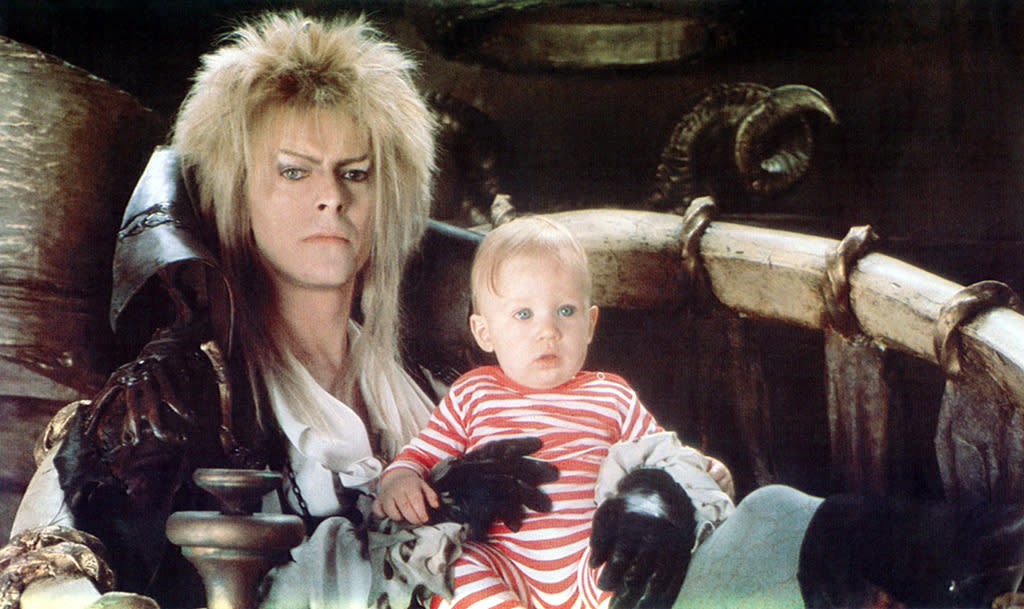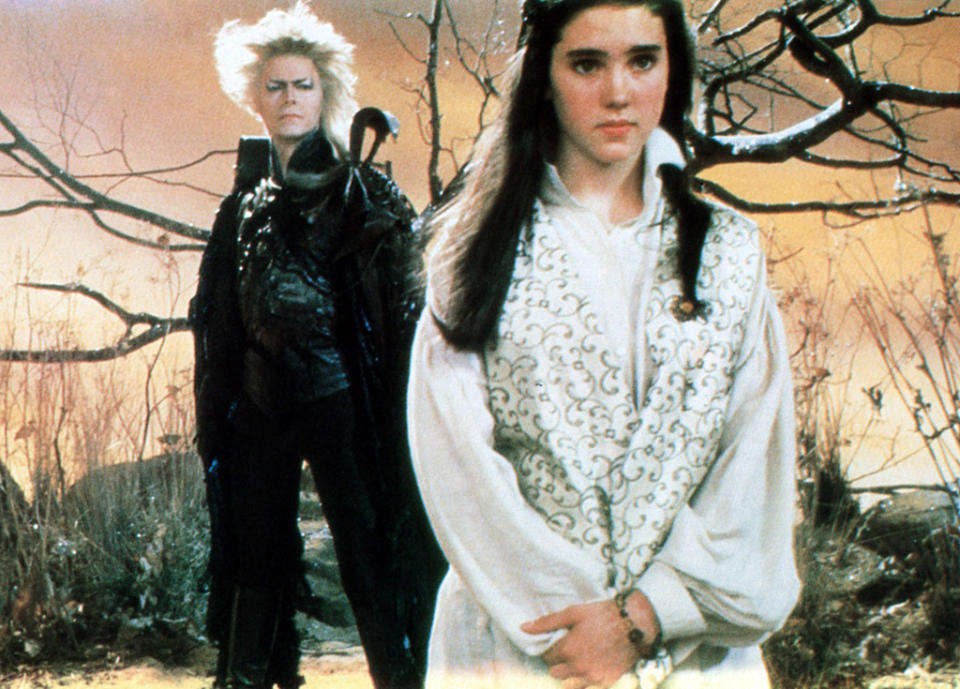The Magic of the Goblin King: An Appreciation for David Bowie in 'Labyrinth'

David Bowie as Jareth the Goblin King, holding baby Toby Froud in ‘Labyrinth’ (Everett)
When I learned this morning that David Bowie died on Sunday night at the age of 69, my first thought was, I can’t even remember a time when I didn’t love him. But that’s not entirely true, because I remember the first time I saw Labyrinth.
I was around eight years old, and the movie had been out on home video for a year. When I was a child, my protective parents were wary of showing me new movies until they screened them first. So it was a big deal when they brought home a VHS tape of the 1986 film and told me I’d like it. “It has Muppets,” my mom said, “and this famous singer plays a bad guy who kidnaps a baby, but you can just tell that he’s good with babies in real life.” That is how Labyrinth earned my mother’s stamp of approval: Muppets and the fact that David Bowie knew how to correctly hold a baby.
Watch a trailer for Jim Henson’s ‘Labyrinth,’ starring David Bowie:
The movie enthralled me. Yes, the film is fundamentally goofy, a hodgepodge of elaborate Jim Henson creatures, British humor, pop-music breaks, and scenes of Bowie harassing puppet goblins while wearing alarmingly tight pants. It’s also a neo-Wizard of Oz, about a girl named Sarah (played by a teenaged Jennifer Connelly) who discovers her own power by journeying through a seductive-but-treacherous imaginary world. Unlike the other fantasy heroines I already loved — Dorothy, Alice, Lucy Pevensie — Sarah didn’t blithely stumble into her adventure. A contemporary girl, she wanted to escape her stifling family life and live in a world where she could be the main character.
The person who makes Sarah’s wish come true is also the film’s villain: Jareth the Goblin King, played by Bowie. During a night of babysitting her infant brother, Sarah dramatically moans that she wants someone to “take me away from this awful place!,” and wishes that the crying child would be kidnapped by goblins. Sure enough, the baby vanishes, and Jareth appears bearing two options for Sarah: Accept a magical crystal in exchange for her brother (“It will show you your dreams,” he coos), or rescue the baby from an impossible-looking maze before the clock strikes 13. She doesn’t hesitate to venture into the labyrinth, but as a kid, I remember wondering why she didn’t ask more questions about that dream crystal. Jareth, after all, is not an ordinary children’s-story villain, cackling and bearing poison apples: He is Sarah’s gorgeous fantasy creation, and everything dangerous — and wonderful — about venturing into the unknown world of adulthood.
Related: David Bowie’s Most Memorable Movie and TV Roles
Throughout the film, Jareth tries to thwart Sarah’s rescue attempt by using her own desires against her — in particular by sending her into a fairy-tale dream of being the beautiful stranger at a masked ball, and casting himself as the smitten prince. (That scene is accompanied by the fantastic ballad “As the World Falls Down,” one of several songs Bowie composed and recorded for the film.) Finally when Sarah, a little older and wiser, arrives at the goblin king’s castle, he offers one last bargaining chip: himself. “Just fear me, love me, do as I say, and I will be your slave,” he pleads. Only then does Sarah understand what it really means to escape into a fantasy: You cede control over your own life. She summons a quote from a favorite play that we saw her recite at the beginning of film — a monologue ending with the words “You have no power over me” — and Jareth’s dark, enticing realm falls to pieces around her.

David Bowie and Jennifer Connelly in ‘Labyrinth’ (Everett)
Safe again at home with her brother, Sarah does one last thing: She looks into a mirror and asks the friends and creatures she met on her magical journey to return. “I don’t know why, but every now and again in my life — for no reason at all — I need you,” she tells them. It’s the opposite sentiment of “There’s no place like home,” an acknowledgment that fantasy can continue to play an important role in her life without dominating it. (It’s also a quintessential Jim Henson conclusion, which doesn’t appear in the original, more cynical script by Monty Python’s Terry Jones.) The film ends with the labyrinth’s Muppet inhabitants celebrating in Sarah’s room while Jareth, disguised as a snowy owl, hovers at the window. Sarah doesn’t see him, but he might never be entirely gone.
For me, Jareth was never entirely gone either. Not long after I saw Labyrinth, some kid-friendly PBS program I was watching transitioned into a concert video from Bowie’s 1987 Glass Spider Tour. My god, I thought, he’s real. As I moved on from the Labyrinth soundtrack to Ziggy Stardust and Hunky Dory, Bowie remained a fantasy character come to life — like Sarah, always one foot in an imaginary realm, creating new personas and exploring new musical labyrinths.
My appreciation for Bowie’s music and life has grown over the years, and while I can tell you why Hours is an underrated album, the embarrassing truth is that I still love him most of all for Labyrinth. But maybe that’s not so embarrassing. After all, the reason he made the film in the first place is the reason his career remains so dynamic and relevant: He wanted to do something entirely new, and felt a kinship with director Jim Henson’s unique vision.
In a quote from the Jim Henson archives, Bowie recalled being blown away by designer Brian Froud’ s Labyrinth concept art and a viewing of Henson’s previous fantasy film The Dark Crystal. “I could see the potential of adding humans to his world of creatures,” Bowie said. “I’d always wanted to be involved in the music writing aspect of a movie that would appeal to everyone, and I must say that Jim gave me a completely free hand with it.” So Labyrinth became a David Bowie film as much as a Jim Henson film, infused with his musical ideas, his bravado performance, and even his sense of humor. (Bowie insisted that Jones give the script another pass after a rewrite left out many of Jones’ jokes.) He seems to have had fun making it too; witness this excerpt from the behind-the-scenes documentary Inside the Labyrinth, in which Bowie repeatedly breaks into laughter while trying to coordinate his movements with the juggler who did his crystal-ball stunts.
Bowie threw himself into the role of Goblin King and inhabited it as fully as he did the Thin White Duke, Ziggy Stardust, or The Man Who Fell to Earth. That performance, seductive and unapologetic, shaped my own understanding of the narrow border between fantasy and reality. I dressed as Sarah to my best friend’s Jareth for a Halloween party when I was 16. In my 20s, I psyched myself up for a difficult work negotiation by repeating the mantra, “You have no power over me.” Sometimes, even the most ridiculous fantasies take on tremendous importance. Bowie understood that better than anyone. And every now and again in my life, I need him.
Watch a video about David Bowie’s legacy:



